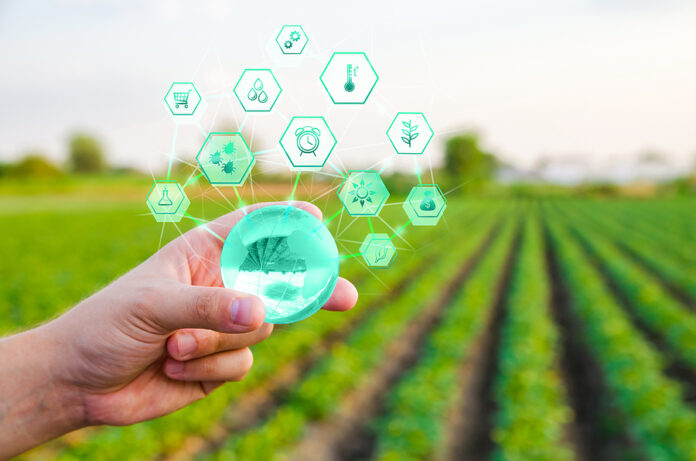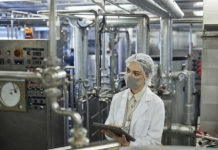
When it comes to artificial intelligence (AI), the food and beverage industry lags behind others that are more advanced, such as finance, security, and healthcare. However, the market size of AI in the food and beverage industry is expected to experience an annual growth rate of 38.30% over the next five years, so the opportunity for AI-driven improvements is immense.
AI’s ability to enhance processes, drive innovation, transform business systems, and inform decision-making is instrumental in achieving faster decarbonization in the food system, thereby mitigating environmental damage and building a more sustainable future. As demands for sustainability and resilience intensify, AI emerges as a powerful tool for addressing these challenges head-on.
The benefits of AI are significant and can lead to competitive advantages for early adopters. While there is a notable focus on efficiency improvements, there is a clear gap in leveraging AI to drive meaningful innovation and transformative changes. It has the capability to revolutionize processes such as supply chain management, product development, and personalized customer experiences in the food industry. However, many companies have yet to fully explore and capitalize on these opportunities for growth and competitive advantage. Nonetheless, companies can start utilizing the benefits AI brings by operating at three distinct levels of impact: efficiency, innovation, and transformation.
Efficiency: optimizing processes
AI can significantly enhance companies’ operational efficiency, allowing companies to dedicate more time and resources to innovation and creativity. Throughout a product’s lifecycle, AI revolutionizes various stages, including process optimization, product formulation, analysis of consumer sentiment, and integration of personalized information. By leveraging advanced algorithms, it can calculate product carbon footprints, match and clean data at super speeds, and calculate a product’s carbon footprint from publicly available data matching that’s already out there. This technology also enables businesses to make data-driven decisions that lead to increased profitability and sustainability, further allowing businesses to streamline their operations, reduce costs, enhance customer satisfaction, and drive innovation.
Innovation: generating new ideas
One of the most exciting aspects of using AI in the food and beverage industry is its ability to foster innovation by generating novel ideas and concepts. In conjunction with machine learning, AI allows for the exploration of what was not there before, for example, creating new ingredients and images of new food products that may not have been discovered through traditional methods. AI enables speedy and accurate calculation of a product’s carbon footprint by leveraging publicly available data at the beginning of the product development process, taking into account additional impact factors like water usage, labor risk, biodiversity, and land use. This can help companies make more sustainable choices in production processes and significantly reduce their environmental impact. Through AI, food companies can stay ahead of consumer habits and industry trends, resulting in innovation in product development and marketing strategies.
Transformation: changing business models
One level of impact that is rarely, if ever, delved into is how AI can evolve the food and beverage industry through its ability to change business models: full systems transformation. In addition to increasing efficiency and innovation, AI has the capacity to strategically redefine food production, distribution, and consumption at a grand level. Its utilization can allow companies to reduce their environmental footprint and promote biodiversity. For example, AI can optimize supply chains to reduce food waste and improve sustainability practices. By leveraging AI-driven insights and technologies, the industry can revolutionize its business models, supply chains, and ecological footprints, driving systemic change and fostering sustainability by introducing groundbreaking solutions to tackle global challenges.
Lasting impact of AI on the food system
Within three years, more than 90% of the food we eat will be touched in some way by AI. The opportunities for AI-based innovation are vast, ranging from optimizing processes and creating new ingredients to revolutionizing business models. As more data from unbiased and reputable sources are fed to AI, the datasets will be more robust. This will allow AI-driven insights to potentially become increasingly accurate and dependable, thereby keeping the food industry at the forefront of digital transformation. By collaborating with industry stakeholders and AI experts, the food industry can have a positive impact and effectively increase decarbonization efforts.
In the long run, through the adoption of AI, the food industry can lead the way in establishing a more sustainable and ethical food ecosystem, thus creating a brighter future for both consumers and the planet.
 Ethan Soloviev is Chief Innovation Officer at HowGood, a third-party research group with the largest food ingredient sustainability database, where he enables major retailers and consumer packaged goods with a sustainability impact platform that models environmental and social impact based on their ingredients and sourcing locations.
Ethan Soloviev is Chief Innovation Officer at HowGood, a third-party research group with the largest food ingredient sustainability database, where he enables major retailers and consumer packaged goods with a sustainability impact platform that models environmental and social impact based on their ingredients and sourcing locations.







